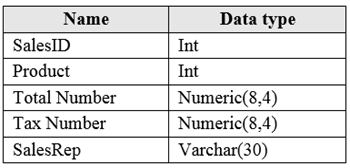

You have an Azure SQL database that contains a table named factSales. FactSales contains the columns shown in the following table.
FactSales has 6 billion rows and is loaded nightly by using a batch process. You must provide the greatest reduction in space for the database and maximize performance.
Which type of compression provides the greatest space reduction for the database?
yChoi
Highly Voted 10 months, 4 weeks agolorenzopp
Highly Voted 10 months, 4 weeks agoJustAnotherDBA
3 years, 1 month agovoodoo_sh
Most Recent 8 months, 2 weeks agosca88
10 months, 3 weeks agoYMMN
1 year, 4 months agoDalamain
1 year, 4 months agoBen999
1 year, 4 months agoNiazDawar
1 year, 6 months agoNiazDawar
1 year, 6 months agoPattuKutty
1 year, 7 months agoPranava_GCP
2 years, 1 month agovictorlie
2 years, 1 month agokeenan_investigates
2 years, 3 months agoBobFar
2 years, 5 months agoPratikSap
2 years, 7 months agogchris7
3 years, 2 months agoazayra
3 years, 4 months agon500458
3 years, 5 months agocalvintcy
3 years, 5 months ago